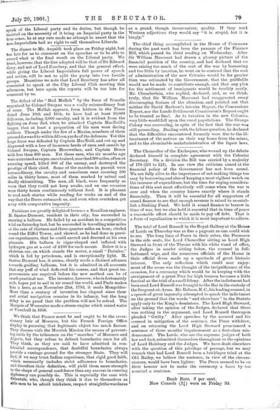The trial of Lord Russell in the Royal Gallery at
the House of Lords on Thursday was as fine a pageant as one could wish to see. The long lines of Peers in their robes, the Peeresses in the side seats, the Lord Chancellor sitting as Lord High Steward in front of the Throne with his white wand of office, the Judges in scarlet sitting below, the counsel in full- bottomed wigs, and the numerous officials of the House in their official dress made up a spectacle of great historic interest. The only reflection which could mar enjoy- ment of the scene was the thought of the insignificance of the occasion, for a ceremony which would be in keeping with the arraignment of a great Peer for high treason becomes a little farcical at the trial of a small felony. After the indictment had been read Lord Russell was brought to the Bar in the custody of the Sergeant-at-Arms. Mr. Robson, K.C., his leading counsel, in a speech of great ingenuity attempted to quash the indictment on the ground that the words "and elsewhere" in the Statute apply only to the King's dominions. The Lord High Steward, after taking the opinion of the Judges, declared that there was nothing in the argument, and Lord Russell thereupon pleaded "Guilty." After speeches by the accused and his counsel in mitigation of the sentence, the Peers withdrew, and on returning the Lord High Steward pronounced a sentence of three months' imprisonment as a first-class mis- demeanant. The Lords, who are the supreme judges of both law and fact, submitted themselves throughout to the opinions of Lord Halsbuty and the Judges. We have dealt elsewhere with the question of this privilege of peerage, but we may remark that had Lord Russell been a bricklayer tried at the Old Bailey, we believe the sentence, in view of the circum- stances, would have been lighter. The Peers seemed to be on their honour not to make the ceremony a farce by too nominal a sentence.


































 Previous page
Previous page